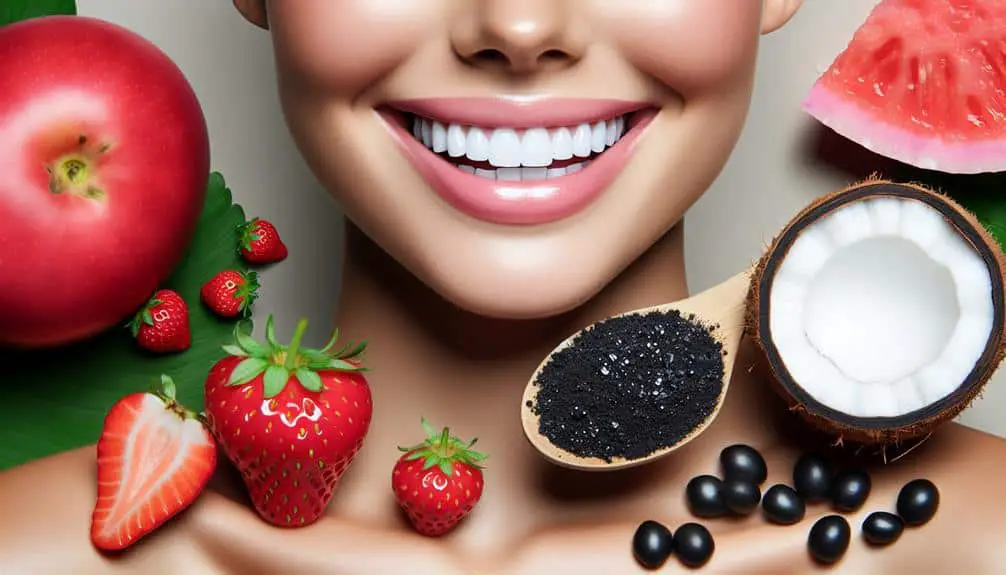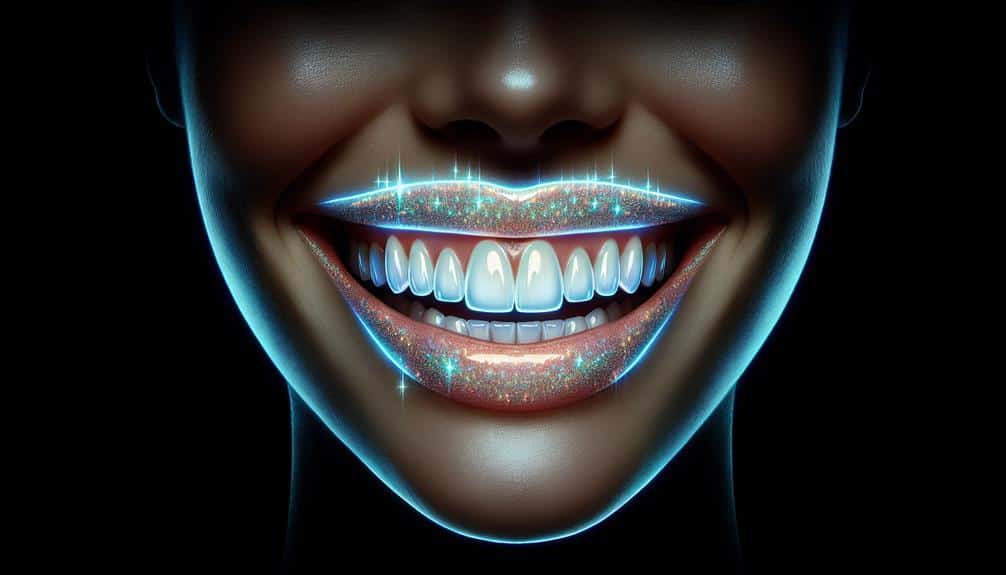Try oil pulling with coconut oil to reduce harmful bacteria for overall oral health. Consider baking soda, known for mild abrasives, as a natural teeth whitening alternative with documented benefits, or explore the rising trend of activated charcoal, which absorbs toxins and stains. Hydrogen peroxide, a common bleaching agent present in many oral care products, boasts antibacterial properties that can aid in preventing gum disease and bad breath. For a fruity approach, rubbing lemon or banana peels against teeth can brighten your smile. Remember, maintaining good oral hygiene is key to long-term success with these whitening techniques.
Key Points
- Oil pulling with coconut oil reduces harmful bacteria for better oral health.
- Baking soda offers natural teeth whitening with mild abrasiveness in homemade recipes.
- Activated charcoal absorbs toxins and stains, but consult a dentist to avoid enamel damage.
- Hydrogen peroxide acts as a bleaching agent, preventing gum disease and bad breath.
- Fruit peels like lemon and banana contain whitening properties when rubbed on teeth.
Oil Pulling
To start your natural teeth whitening journey, consider incorporating oil pulling into your oral care routine. This ancient Ayurvedic practice involves swishing oil around in your mouth to improve oral health. The most commonly used oil for this practice is coconut oil due to its antimicrobial properties that can help reduce harmful bacteria in the mouth. Oil pulling is believed to remove toxins from the oral cavity, which can contribute to overall oral health and potentially whiten teeth over time.
When you swish oil in your mouth, it helps to eliminate bacteria and promote healthy gums. This process can also reduce plaque buildup, which is a common issue leading to yellowing of teeth. By incorporating oil pulling into your daily routine, you can potentially improve your oral health and gradually notice a brighter smile.
Incorporating this Ayurvedic practice into your oral care routine may take some getting used to, but the benefits for your oral health and teeth whitening goals can be significant.
Baking Soda
Consider using baking soda as a natural alternative for teeth whitening. Baking soda, also known as sodium bicarbonate, possesses mild abrasive properties that can help remove surface stains on teeth effectively. Its benefits for teeth whitening are well-documented, making it a popular choice for those looking for a natural solution to enhance their smile.
One of the simplest homemade recipes involving baking soda for teeth whitening is to create a paste by mixing a small amount of baking soda with water until a thick consistency is formed. This paste can then be applied to a toothbrush and used to brush your teeth gently for about two minutes. Remember to rinse thoroughly afterward to remove any residue.
Another popular method is mixing baking soda with hydrogen peroxide to create a whitening solution. This mixture can be used as a mouthwash after regular brushing to help whiten teeth over time. However, exercise caution with this method and avoid using it excessively to prevent damage to the enamel.
Activated Charcoal
Activated charcoal, a black powder produced by heating carbon-rich materials, is gaining popularity as a natural teeth whitening alternative due to its ability to absorb toxins and stains from the teeth's surface. Many people are intrigued by the idea of using charcoal for teeth whitening, but it's crucial to understand the facts before jumping on the bandwagon. Here's what you need to know:
- Charcoal Toothpaste, Trend or Truth?
Charcoal toothpaste has become a trendy product in the oral care market, claiming to whiten teeth effectively. However, the effectiveness of charcoal toothpaste in whitening teeth is still a topic of debate among dental professionals.
- Charcoal Teeth Whitening Risks and Benefits.
While activated charcoal can help remove surface stains from the teeth, it's abrasive and can wear down the enamel if used too aggressively. Additionally, there's limited scientific evidence supporting the long-term benefits of charcoal teeth whitening.
- Consult Your Dentist.
Before using activated charcoal for teeth whitening, it's recommended to consult your dentist to understand the potential risks and benefits specific to your oral health.
Hydrogen Peroxide
Hydrogen peroxide, a common household product, is recognized for its teeth whitening properties and is often used in oral care routines. It acts as a bleaching agent and has been included in many whitening toothpaste and mouthwash products due to its ability to remove surface stains on teeth effectively. When used in moderation and with caution, hydrogen peroxide can help enhance the appearance of your smile by lightening the color of your teeth.
In oral health, hydrogen peroxide is known for its antibacterial properties, which can help reduce harmful bacteria in the mouth and contribute to overall oral hygiene. It can assist in preventing gum disease and bad breath by eliminating microbes that may cause these issues.
As with any whitening agents, it's essential to use hydrogen peroxide as directed to avoid potential side effects such as tooth sensitivity or gum irritation. Consulting with your dentist before incorporating hydrogen peroxide into your oral care routine can ensure that you use it safely and effectively for a brighter, healthier smile.
Fruit Peels
Exploring natural alternatives for teeth whitening, fruit peels offer a potential solution that may intrigue you. When it comes to brightening your smile, consider the power of lemon peels and banana peels. These common fruits contain natural compounds that can help whiten your teeth effectively.
Here are three ways fruit peels can contribute to a brighter smile:
- Lemon Peels: The citric acid in lemon peels has natural whitening properties that can help remove stains from the surface of your teeth. Rubbing the inner part of a lemon peel against your teeth for a few minutes can help reduce yellowing and brighten your smile over time.
- Banana Peels: Banana peels contain minerals such as potassium, magnesium, and manganese, which can help whiten teeth. Rub the inside of a ripe banana peel gently against your teeth for a couple of minutes each day. The manganese content in banana peels may help remove stains and discoloration for a naturally brighter smile.
- Additional Tips: Remember to brush your teeth with regular toothpaste after using fruit peels to remove any residual sugars or acids. Maintaining good oral hygiene practices alongside natural whitening methods is crucial for achieving positive outcomes.
Frequently Asked Questions
Are There Any Potential Side Effects or Risks Associated With Using These Natural Teeth Whitening Methods?
When using natural teeth whitening methods, be aware of potential risks and side effects. Long-term effects may include heightened sensitivity levels. It's imperative to monitor any changes and consult with a dental professional if needed.
How Long Does It Typically Take to See Noticeable Results From Using These Natural Teeth Whitening Alternatives?
Typical duration for noticeable results from natural teeth whitening varies, averaging 1-2 weeks with consistent use. Best practices include daily application and avoiding staining substances. Patience and adherence to routines enhance effectiveness and results.
Can These Methods Be Used on Sensitive Teeth or Will They Cause Additional Sensitivity?
If you have sensitive teeth, natural whitening methods can still be safe and effective. Look for options with gentle ingredients, consider duration and frequency of use, dietary enhancements, and any age restrictions to guarantee whitening without causing additional sensitivity.
Are There Any Specific Dietary or Lifestyle Changes That Can Enhance the Effectiveness of These Natural Teeth Whitening Methods?
To enhance the effectiveness of natural teeth whitening methods, consider dietary modifications like consuming crunchy fruits and veggies, reducing intake of staining foods/drinks. Lifestyle habits such as quitting smoking and maintaining good oral hygiene can also aid in achieving whiter teeth.
Are These Natural Teeth Whitening Alternatives Safe for Use by Children or Pregnant Women?
When considering the safety of natural teeth whitening options for children and pregnant women, it's important to prioritize their well-being. Always consult with a healthcare professional to guarantee the use of safe ingredients and alternatives.



